













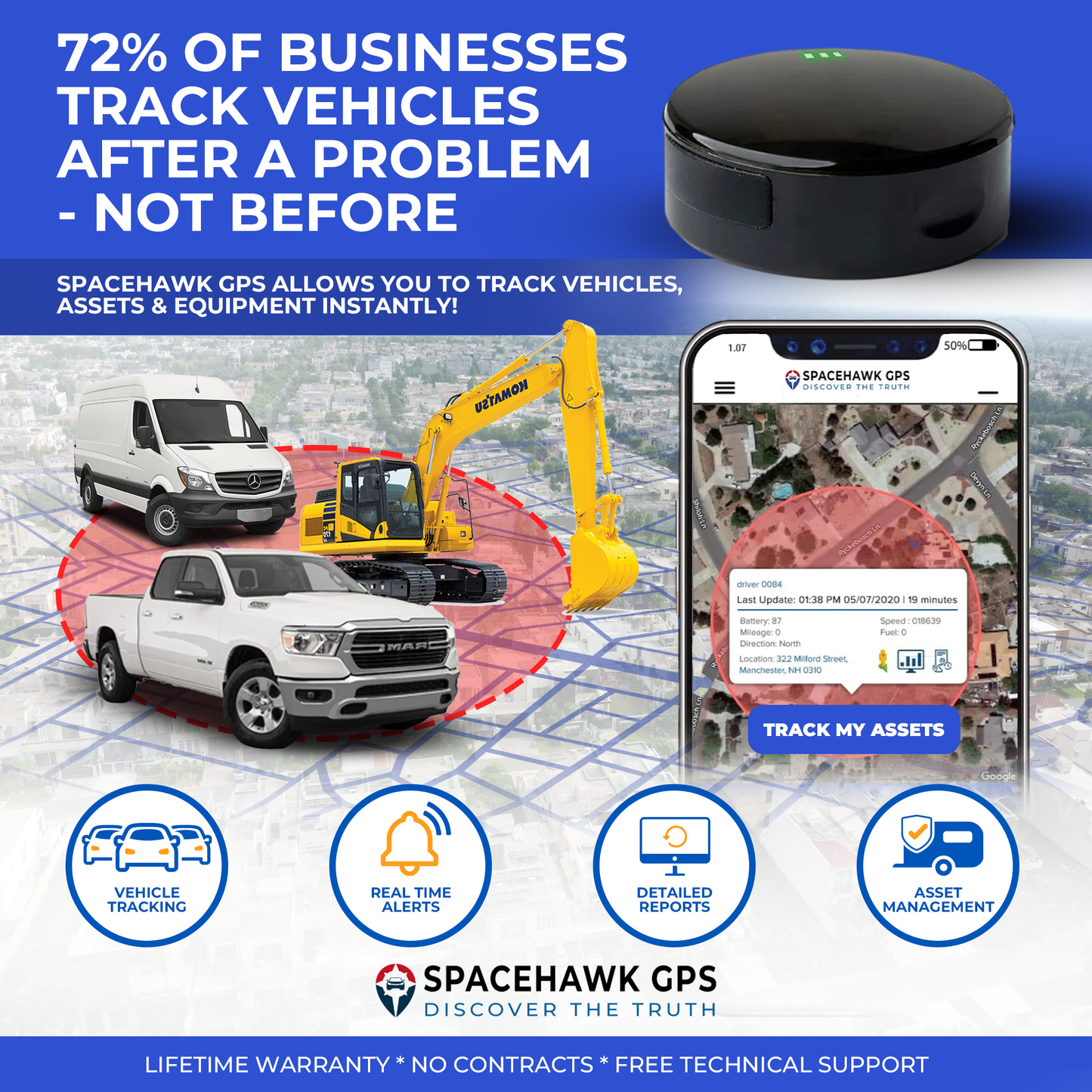
Real Data. Real Answers.
Are You Worried About:
Crack heads breaking into your car at night?
Your wife working late then going to a Cold Play concert?
Your teen driving double the speed limit (in YOUR car)?
Employees driving work vehicles like idiots?
Introducing: The most accurate, longest-lasting, and advanced hidden GPS tracker for car theft, global fleet management, and family tracking on the market!
-

Super Durable
Waterproof housing ultra-powerful magnetic mount.
-

Free USPS Shipping
Free shipping and expedited shipping. Your information is kept 100% private.
-

USA Based Support
USA-Based technical support agents are available by phone Monday-Friday, and 7 days a week via email!
Real Time GPS Tracker
SpaceHawk is a premium real time GPS tracker engineered and supported here in the USA. With this device you get protection, security, and most importantly - ANSWERS!
Trust the only mini GPS tracker called upon by private investigators and law enforcement!

Why SpaceHawk GPS Tracking?
- Track your fleet to keep jobs running smooth.
- Watch a loved one’s route for peace of mind.
- Know where your car is — anytime, anywhere.
- Recover stolen assets fast.
- Get answers 24/7
You deserve answers. We understand you are tired of theft, lies, all the BS, and uncertainty. That is why you need the SpaceHawk hidden GPS tracker.
Vehicles, construction equipment, trailers, golf carts, motorcycles, and loved ones can all be protected with this GPS tracking device!
What Is GPS Tracking
The First Undetectable Hidden GPS Tracker For Cars & Assets!
Apple AirTags can easily be detected on a car because they use Bluetooth connection. Not the SpaceHawk real time GPS. This mini GPS is the same tech that private investigators use to bust cheaters. SpaceHawk is small, silent, and a durable beast of a tracker. And yes, undetectable by drivers!
You deserve answers. Let SpaceHawk get them for you!
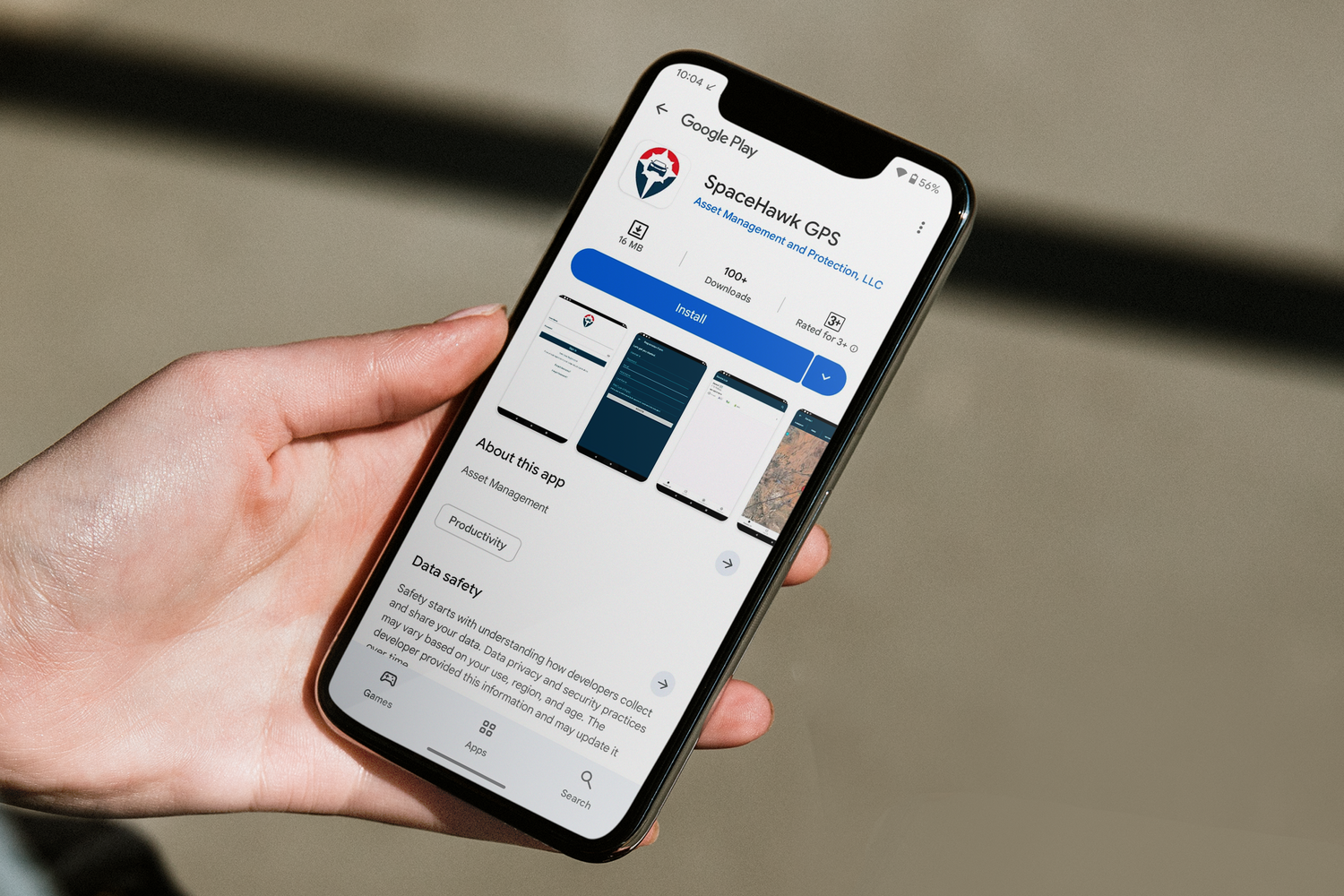
Easy To Use Vehicle GPS Tracker Device
No wires. No setup. Just stick SpaceHawk under the car and start tracking in seconds — it’s that easy.
See why experts rate SpaceHawk GPS tracker as one of the top-rated solutions for monitoring cars, equipment, and assets.
Best GPS Tracker For Car Ever Made. Here Is Why:
Powerful Magnetic Mount
Slap it on and go. ATV? Truck? Heavy equipment? No problem. This tracker sticks strong to almost any metal surface—no wires, no bulky cases, no tools required. Just attach it and let it work. Simple. Secure. Built to stay put.
We Hate AI And Chatbots
Nothing personal, we just think our customers deserve better. SpaceHawk GPS offers HUMAN support via live chat, email, and even over the phone (WHAT?!?! In 2025?!?). We’ll even generate a live link you can share with police to get your assets back safely ASAP..
Tough as Nails
This ain’t a plastic toy your toddler could snap in half. This bad boy is durable and waterproof (NOT water “resistant”) with a magnet so tough, Mike Tyson couldn’t rip it off if he wanted to (we haven’t tested that yet though…).
Greater Accuracy
There’s nowhere to hide when you use SpaceHawk. The hidden GPS tracker shows the exact location within inches. We use the global GNSS satellite system - NOT just Bluetooth or cell towers - to paint the most accurate picture possible. If something is lost or stolen, the police will know exactly where to look.
Up to 5x The Battery Life
Cheap trackers use 600MaH batteries that die in a few hours. Ours uses a 1500MaH battery that can last for weeks or months in saver mode. For you, that means total peace of mind knowing your assets, family, or fleet vehicles will always be under constant watch without recharging or changing batteries every week.
Built With Your Business in Mind
Do you really want to trust your cars or trucks to a tracker meant for car keys or backpacks? You need a tracker that processes everything - location, speed, route history, analytics. With the SpaceHawk hidden GPS, you’ll never have to worry about inefficiency, theft, or drivers breaking the rules again.
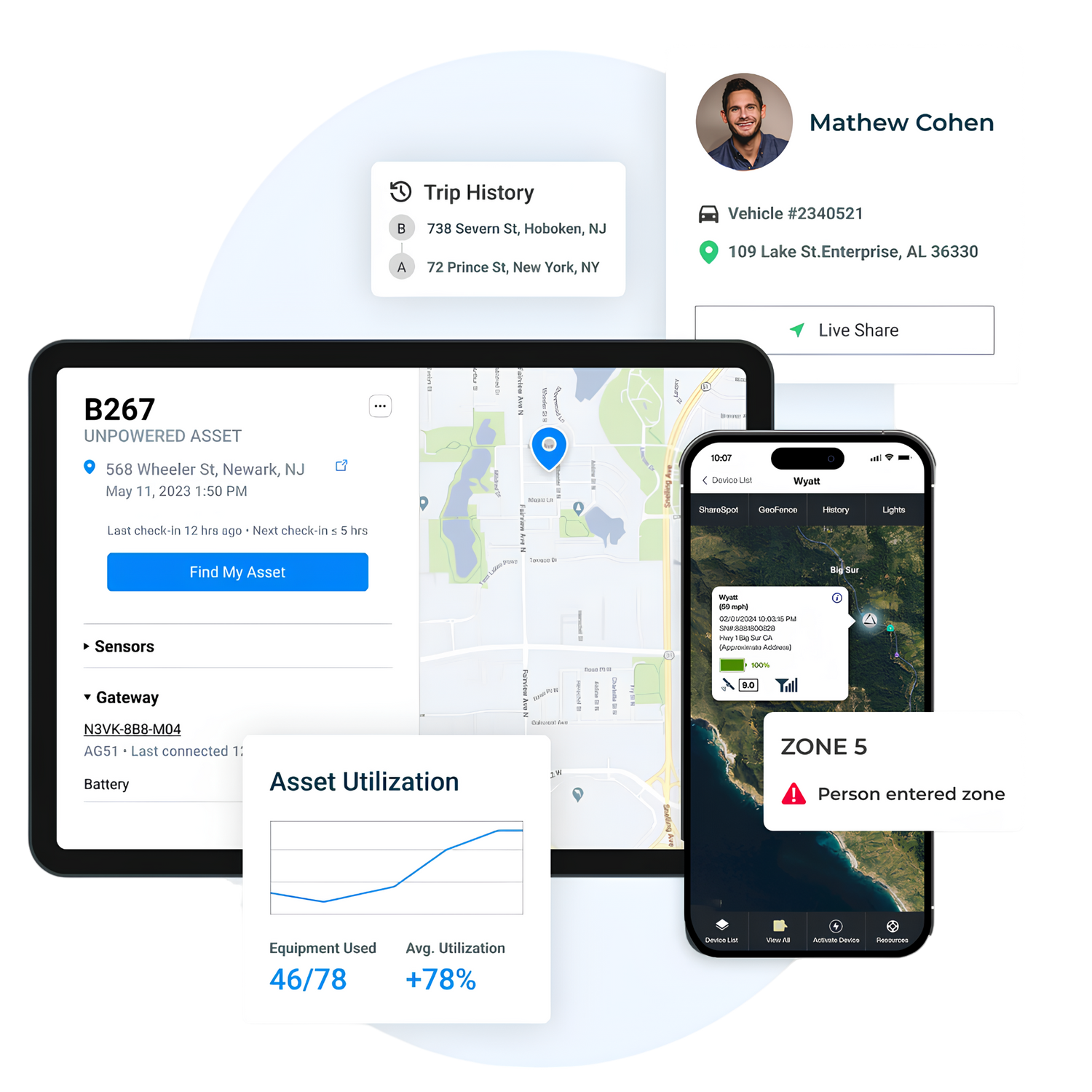
5 Key Features
Live Location Updates
See exactly where your vehicle is 24/7.
Magnetic Mount
Snap it under the car in seconds.
Waterproof Housing
Rain, mud, snow? No problem. Built tough to handle whatever the road throws at it.
App-Based Tracking
Track from your phone or desktop. Get speed, location history, and alerts with just a tap.
Instant Alerts
Get notified if the car moves, speeds, or leaves a set area. Stay in control from anywhere.
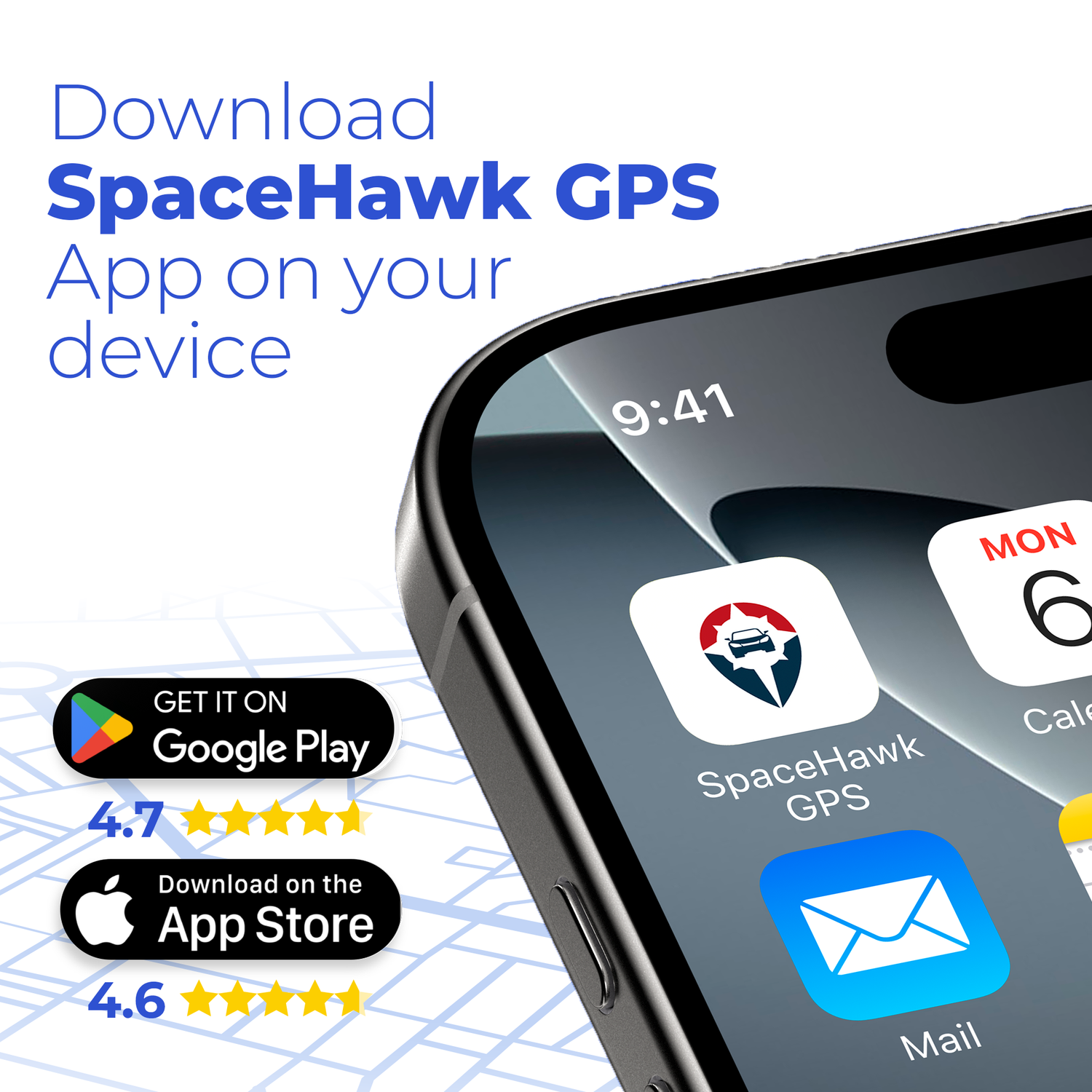
#1 Rated Real Time GPS Tracker For Car App
Rated 4.5 out of 5 stars on the Apple Store and Google Play stores, the SpaceHawk GPS tracking app is the #1 real-time GPS tracking app on the market today! Our intuitive, user-friendly app is designed for everyone, regardless of tech expertise to get answers right from their iPhone or Android devices.
And if you ever do need assistance, our support team—real humans, not chatbots—based in the USA is ready to help. So, SpaceHawk is more than a GPS tracker for cars, assets, and fleets; it's a user-friendly tool designed to give you the answers you need.
SpaceHawk Real Time GPS Tracker Is Perfect For:
WAIT! - We Aren’t Done Bragging Yet
#1 Rated GPS Tracking App
Our SpaceHawk app is so simple even dinosaurs like us can use it with 0 issues. Set up takes 5 minutes, then you’re ready to see the exact location at all times. That’s how we’ve maintained a close to 5-star rating since we launched.
Constant Connectivity
Those cheap toys use Bluetooth, meaning they’re dependent on other devices. That’s childsplay. This is a fully autonomous GPS tracker that uses military-grade GNSS satellites. That means you’ll be covered at all times, no matter where you are.
Lifetime Warranty
You’ve got nothing to lose. Thousands of happy customers are using the SpaceHawk hidden GPS car tracker and love it.
Learn More About Hidden GPS Tracking devices
Real Time GPS Tracking FAQs
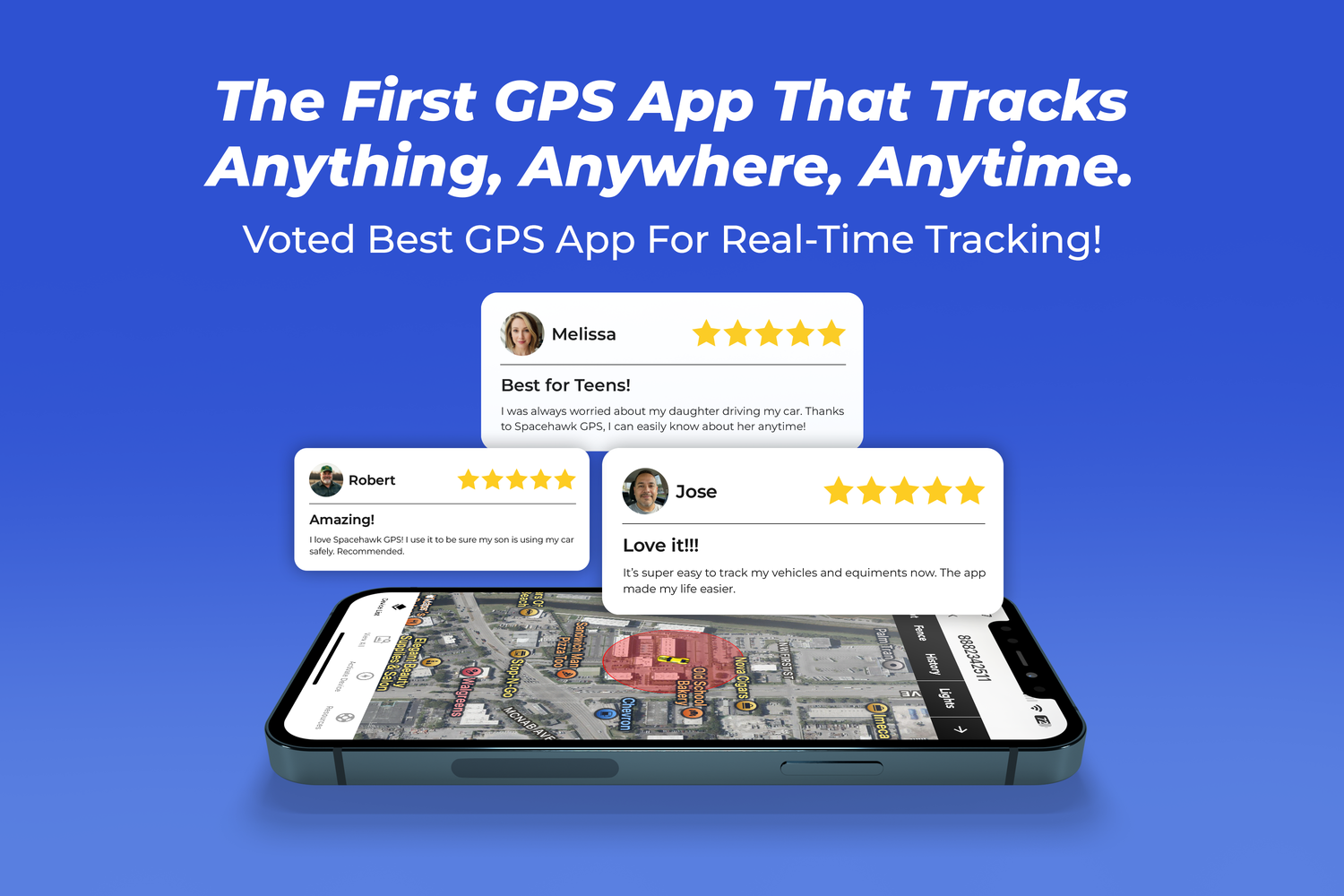
What Are GPS Tracking Devices?
GPS trackers are devices that use the Global Positioning System to pinpoint their exact location. You'll find these in various forms, like in vehicles, smartphones, and as portable units. They connect with a network of satellites to accurately determine their position on Earth. Here's how they work:
- Receiving Signals: GPS trackers receive signals from a network of satellites orbiting the Earth.
- Calculating Coordinates: They use these signals to calculate their geographical coordinates (latitude, longitude, and sometimes altitude).
- Relaying Data: This location data is then relayed to your device (like a smartphone or computer).
- Real-Time Monitoring: Enables you to monitor the tracker's location in real-time.
- Location History Review: Allows you to review the location history of the tracker.
What Do GPS Trackers Look Like?
If you're curious what a GPS tracker looks like, it first helps to know their common features. First, let's take a closer at the most popular types of hidden GPS trackers - the wireless real time ones. These devices are often used for monitoring assets or to secretly track cars. Let's break down their typical characteristics:
- Compact Design: Resembling a matchbox or a deck of cards, these trackers are small and discreet. You can easily hide them inside a vehicle.
- Magnetic Casing: Many have magnetic casings for easy attachment under the vehicle, securing firmly to the frame.
- Internal Antenna: They usually feature an internal antenna, crucial for receiving GPS data and transmitting information.
- Rechargeable Battery: Expect a rechargeable battery, ensuring they keep tracking even when the vehicle is stationary or in motion.
- Multiple Functionalities: Beyond location tracking, some models also monitor driving behaviors or offer parental controls for extra security.
Additionally, hidden GPS trackers can be more covertly installed. They can connect to the OBD2 port, which is a standard diagnostics connector in vehicles. Alternatively, they can be hardwired directly to your vehicle's 12-volt system. In this case, the tracker would not be visible to the driver.
Each of these aspects contributes to the effectiveness and convenience of GPS trackers, making them ideal for various tracking needs.
AirTag VS GPS Tracker - What's The Difference?
When you're weighing Apple AirTags against GPS trackers, it's key to understand their best uses. AirTags, designed by Apple, are ideal for personal belongings. GPS trackers, on the other hand, excel in secretly tracking vehicles and safeguarding assets. Let's take a closer look into the specifics:
- Apple AirTag Features: Small and lightweight, AirTags are perfect for tracking items like car keys and luggage. Controlled through an iPhone app, they show the item's location on a map. Handy for items you carry daily, they alert you when your belongings leave a set area.
- GPS Tracker Features: GPS trackers are versatile, used for tracking vehicles, equipment, or even people. They work by using satellite data to pinpoint an object's exact location. Ideal for monitoring vehicles or valuable assets, they offer real-time location tracking.
- How AirTags Work: AirTags operate within a Bluetooth range, about 10 meters. They sync with your Apple device, updating the location of tagged items. However, when used as vehicle trackers, they're easily detectable by drivers.
- How GPS Trackers Work: Using GPS signals or Wi-Fi, GPS trackers provide precise indoor and outdoor positioning. They send this data to a server, accessible by you for real-time tracking.
- AirTags for Personal Use: AirTags shine in monitoring personal items. They're great for things you frequently misplace, offering a quick way to locate them through Apple's "Find My" app.
- GPS Trackers for Asset Protection: GPS trackers are more suited for tracking vehicles or high-value assets. They're essential for companies or individuals needing to track items in transit. Trackers monitor driving behavior and location, helping prevent theft.
In summary, AirTags are best for everyday items such as car keys and luggage, whereas GPS trackers for more discreet, and ideal for secretly tracking vehicles. This understanding ensures you select the right tool for your specific tracking requirements.
Do Car GPS Trackers Require A Subscription?
Yes, all real-time GPS trackers require a subscription. The subscription covers the cost of the cellular data that the tracker uses to transmit its location information.
Here's why a data plan is essential for real-time tracking:
- Constant Data Transmission: Real-time GPS trackers continually send location data. This requires a constant cellular data connection, much like a smartphone. And it is the reason why GPS devices that update positions more frequently require more expensive data plans.
- Access to Cellular Networks: The subscription ensures the tracker has access to cellular networks. Without this, your GPS tracker can't send location data to the server which allows you to monitor your vehicle or asset.
- Server Use: The data from the tracker is sent to a server. This server processes the information, superimposes it over an online mapping program, and makes it accessible to you, usually via an app.
Therefore, all real-time GPS trackers require a monthly fee for constant location transmission and access to cellular networks. This allows you to track your assets in real time, from anywhere!
Are GPS Trackers Legal?
Yes, GPS trackers are 100% legal to purchase and own. You have the freedom to buy a GPS tracker without encountering any legal issues. However, the legality of using a GPS tracker, especially for tracking someone's car, depends on how and where you use it. Here are some examples where it is typically legal to track a car with a GPS device:
- Monitoring Your Own Vehicle: Using a GPS tracker on a car that you own, such as keeping tabs on its location for security purposes, is legal.
- Teen Driver Safety: Parents often use GPS trackers to monitor the driving habits and whereabouts of their teen drivers for safety reasons.
- Fleet Management: Businesses use GPS trackers to manage their fleet of vehicles, ensuring efficient use of resources and monitoring for safety compliance.
- Lending or Leasing Companies: If a car is leased or financed, the lender may legally install a GPS tracker to locate the vehicle in case of default on payments.
In contrast, using a GPS tracker without consent in situations like tracking a spouse can lead to legal issues. The key is consent; if the person being tracked is aware and agrees to it, the usage is generally legal. Keep in mind that while buying and owning a GPS tracker is completely legal, its application must adhere to legal standards, and this varies depending on your intent and the situation. Therefore, it's always best practice to check the specific laws in your state or consult a legal expert to ensure that your use of a GPS tracker remains within legal parameters.
Can A Cell Phone Detect The GPS Tracker?
No, a cell phone can’t detect the SpaceHawk GPS tracker.
Here’s the deal: SpaceHawk isn’t some Bluetooth tag like an AirTag that pings iPhones and triggers those annoying “unknown device” alerts. Nope. This is a premium hidden GPS tracking device built for real-time tracking through GPS satellites and cellular networks—not Bluetooth. That means your phone doesn’t have a built-in feature to sniff it out.
AirTags work differently. Apple designed them to pair with its network and to warn people if one’s traveling with them. Great for finding lost keys, not so great for staying hidden. SpaceHawk plays in a whole other league. It’s completely silent. No notifications. No app randomly telling you, “Someone might be tracking you."
Unless you’re running a dedicated bug detector or RF scanner, your phone won’t magically sense it. Why? Because standard phones aren’t designed to detect active GPS trackers like SpaceHawk. They only pick up Bluetooth-based devices—and SpaceHawk doesn’t broadcast like that.
Pretty stealthy, right? That’s the whole point. SpaceHawk is built for serious stuff: protecting assets, monitoring fleets, or getting solid answers when you need the truth.
Can A GPS Be Traced Back To Owner?
No, a GPS tracker cannot typically be traced directly back to its owner merely based on the device or its serial number. Here are the key reasons why:
- Serial Number: GPS trackers are associated with serial numbers, not individuals' names. Most do not require personal registration that ties the device to an owner's identity.
- Anonymity in Purchase: GPS tracking devices can be purchased anonymously, especially if bought with cash or using a prepaid card. There's no automatic system to link the device to its purchaser.
- Real-Time Trackers and Data Plans: Real-time GPS trackers do require a data plan to transmit location information. However, these subscription plans can often be purchased with prepaid gift cards, making it difficult to trace the plan, and thus the tracker, back to the actual user. This level of anonymity further complicates directly associating a tracker with its true owner.
- Privacy Policies: Even if you find a hidden GPS tracker on your vehicle and identify the manufacturer, the company will typically not disclose the purchaser's details due to privacy policies. These policies are designed to protect the privacy of individuals who buy their products, including GPS trackers. In a situation where you have a suspicion about who placed the tracker, the company still would not reveal this information without legal compulsion. Basically, you would need to get a subpoena from a judge to force the company to share any personal details of a buyer in order to trace the device back to its owner.
In essence, the very nature of how GPS vehicle trackers are purchased, used, and the anonymity options available, especially with prepaid services for real-time trackers, makes it challenging to directly link a tracker to its true owner.





























